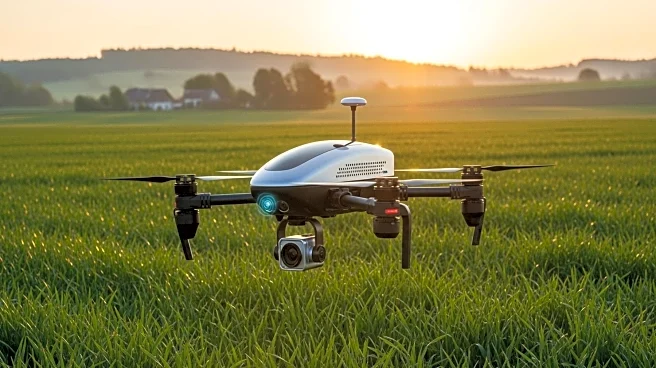What's Happening?
Artificial intelligence (AI) is increasingly being integrated into agricultural practices, providing tangible benefits to farmers in their daily operations. Heather Hampton Knodle, president of Knodle Farms in Illinois, highlighted the practical applications of AI in agriculture during her presentation at the Rural Economic Outlook Conference at Oklahoma State University. She emphasized that AI is no longer a futuristic concept but a present reality on farms, aiding in tasks such as crop management and resource optimization. Despite its advantages, Knodle pointed out that connectivity issues in rural America remain a significant barrier to fully leveraging AI technologies.
Why It's Important?
The integration of AI in agriculture represents a significant advancement in farming technology, offering potential improvements in efficiency and productivity. By automating routine tasks and providing data-driven insights, AI can help farmers optimize crop yields and manage resources more effectively. However, the lack of reliable internet connectivity in rural areas poses a challenge to widespread adoption, potentially limiting the benefits that AI can offer. Addressing these connectivity issues is crucial for ensuring that farmers across the U.S. can fully utilize AI technologies to enhance their operations and contribute to sustainable agricultural practices.
What's Next?
Efforts to improve rural connectivity are essential for maximizing the benefits of AI in agriculture. Stakeholders, including government agencies and technology providers, may need to collaborate to develop infrastructure solutions that ensure reliable internet access in rural farming communities. Additionally, ongoing research and development in AI applications tailored to agriculture could further enhance the technology's effectiveness and accessibility. As these challenges are addressed, the adoption of AI in agriculture is likely to expand, offering farmers new tools to improve productivity and sustainability.
Beyond the Headlines
The integration of AI in agriculture not only promises immediate operational benefits but also raises broader questions about the future of farming. Ethical considerations regarding data privacy and the impact of automation on employment in rural communities may emerge as AI becomes more prevalent. Furthermore, the shift towards technology-driven agriculture could influence cultural perceptions of farming, potentially attracting a new generation of tech-savvy individuals to the industry.











